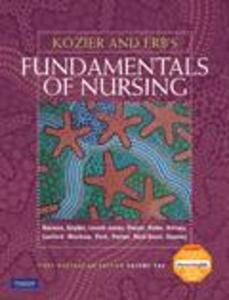Promoting health in young and middle-aged adults
Fillingham, Amanda (2010) Promoting health in young and middle-aged adults. In: Berman, Audrey, Snyder, Shirlee J., Kozier, Barbara, Erb, Glenora, Levett-Jones, Tracy, Dwyer, Trudy, Hales, Majella, Harvey, Nichole, Luxford, Yoni, Moxham, Lorna, Park, Tanya, Parker, Barbara, Reid-Searl, Kerry, and Stanley, David, (eds.) Kozier and Erb's Fundamentals of Nursing. Pearson Australia, Frenchs Forest, NSW, Australia, pp. 409-422.
![[img]](https://researchonline.jcu.edu.au/16204/1.hassmallThumbnailVersion/16204_Fillingham_2010_Book_Cover.jpg)
|
Image (JPEG) (Book Cover)
- Cover Image
Download (5kB) |
|
|
PDF (Published Version)
- Published Version
Restricted to Repository staff only |
Abstract
For years Kozier & Erb’s Fundamentals of Nursing has been the gold standard in helping students embarking on their nursing careers. This first Australian edition retains many of the features that have made this textbook the number-one choice of nursing students and lecturers.
To further enhance this popular fundamentals textbook and ensure its appropriate application for Australian students, nursing academics from across Australia were invited to review and comment on each of the 52 chapters. Their detailed feedback has ensured that Kozier & Erb’s Fundamentals of Nursing: First Australian Edition is a current, engaging and uniquely Australian textbook that will help students succeed in their nursing studies.
Kozier and Erb’s Fundamentals of Nursing, First Australian Edition presents the fundamentals of nursing care within the framework of the nursing process. This text offers an accessible writing style; a focus on practical application with real-world Australian examples and case studies; appropriate Australian terminology, policies and procedures, Australian visuals; an integrated approach to Australian Indigenous health issues; and up-to-date references, research and codes of practice, with reference to ANMC guidelines. The text is supported by a state-of-the art technology package to enhance the learning process.
Chapter 22: The adult phase of development encompasses the years from the end of adolescence to death. Because the developmental tasks of young adults differ from those of older adults, adulthood is often divided into three phases: young adulthood, middle adulthood and late adulthood. In this book, young adults are defined as people 20 to 40 years old and middle-aged adults as 40 to 65. It is important to remember that the adult age span includes three very different generations: the Baby Boomers (born in years 1945-1964), Generation X (birth years 1965- 1978) and Generation Y or the Millennials (birth years 1979-2000). Each cohort has shared specific life events and has its own world view, making them quite diverse in some ways. At this point, it is unclear if these generational differences will prompt new developmental theories, or if the differences are in 'generational personalities' and values. Baby Boomers are characterised by an individualistic outlook, tend towards a 'workaholic' orientation, want to be respected at work, but feel role overload (Sanots & Cox 2000; Hill 2004; Hu, Herrick & Hodgin 2004). Generation Xers were frequently raised in two-worker households where long hours at work were common. They may now be less impressed with corporate values, are more skeptical, resist authority, but enjoy challenges and opportunities to creatively problem-solve. Finally, Generation Y (or Millennials) have come of age in an increasingly multicultural Australia, are technologically sophisticated and enjoy public affirmation of their efforts. This chapter applies the concepts of growth and development introduced in Chapter 20 to the young adult and middle-aged adult. Each developmental stage includes physical, psychosocial, cognitive, moral and spiritual aspects. Also included are health problems and health assessment and promotion guidelines.
LEARNING OUTCOMES - Compare and contrast the following generational groups: Baby Boomers, Generation X and Generation Y. - Describe the usual physical development occurring during young and middle adulthood. - Identify characteristic tasks of development during young and middle adulthood. - Explain changes in cognitive development throughout adulthood. - Describe moral development according to Kohlberg throughout adulthood. - Describe spiritual development according to Fowler throughout adulthood. - Identify selected health problems associated with young and middle-aged adults. - Identify developmental assessment guidelines for young and middle-aged adults. - List examples of health promotion topics for young and middle adulthood.
| Item ID: | 16204 |
|---|---|
| Item Type: | Book Chapter (Teaching Material) |
| ISBN: | 978-1-4425-0469-1 |
| Keywords: | Baby Boomers, boomerang kids, climacteric, generation X, generation Y, generativity, intimacy, maturity, menopause, Papanicolaou (Pap) smear |
| Related URLs: | |
| Additional Information: | An updated version of this chapter can be found at the related URL. |
| Date Deposited: | 21 Apr 2011 00:10 |
| FoR Codes: | 11 MEDICAL AND HEALTH SCIENCES > 1110 Nursing > 111099 Nursing not elsewhere classified @ 100% |
| SEO Codes: | 92 HEALTH > 9202 Health and Support Services > 920210 Nursing @ 100% |
| Downloads: |
Total: 162 Last 12 Months: 5 |
| More Statistics |



